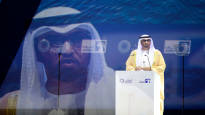The climate conference in Dubai, which started today, is chaired by the CEO of an oil company. The choice has received a lot of criticism, but there are also people who understand.
A fox as a chicken guard or a visionary and a bridge builder? Here is a black and white juxtaposition of how the world sees Sultan Ahmed Al Jaberin.
The truth is often found in different shades of gray and in two weeks we will know better if the chairman of the Dubai climate meeting is just a puppet of the oil economy or if he is looking for a genuine solution to the climate crisis.
Al Jaber has an impressive resume. He has a PhD in economics from Coventry University in England. In 2006, he was founding the renewable energy company Masdari of the United Arab Emirates and has been the country’s climate ambassador for years.
But there is a contradiction in the resume: in addition to being the president of the Climate Summit, Al Jaber is also the CEO of ADNOC (Abu Dabhi National Oil Company) and the Minister of Industry and Technology of the United Arab Emirates.
A threat or a possibility?
The arrangement is new in UN circles, the sitting CEO has never served simultaneously as the chairman of the climate conference. In addition to own interests, the question of time management also arises. How can you handle two busy tasks at the same time?
Contrary to what many hoped, Al Jaber has not given up his position as CEO during the meeting. Criticism of Al Jaber’s appointment has been huge, for example the former vice president of the United States Al Gore and climate activist Greta Thunberg have expressed their disappointment with the choice.
There are also people who understand Al Jaber. US Climate Ambassador John Kerry is willing to give him a chance, as is the former British Prime Minister Tony Blair.
Why are there also people who understand Sultan Al Jaber? The reason can be found in his climate philosophy, where the seed of opportunity may lie.
Al Jaber’s thoughts on climate change represent the modern climate diplomacy of Middle Eastern countries. When interpreting it, it is necessary to remember that these countries have their own cow in the ditch.
The chairman emphasizes in his statements that the reduction of fossil fuels is necessary and in time they must be abandoned, but it can still be done. Oil is needed in the transition phase.
Al Jaber has taken on a bigger role than his predecessors during the meeting. He has emphasized the importance of the private sector and invited the oil and gas companies to the meeting. According to Al Jaber, the political process must be supplemented with private capital and business thinking.
For critics, he is just an oil lobbyist, but he himself believes that he is a realist and a bridge builder between politics and the business world.
Although, even before the start of the meeting, Al Jaber has had time to take a dent in his media image. for the BBC of leaked documents based on this, Al Jaber and the United Arab Emirates planned negotiations with the participating countries on the export of oil and gas under the cover of the meeting. The organizers have denied the claims.
Al Jaber has also exchanged letters with the delegates by e-mail from ADNOC’s servers. The oil company has thus received information regarding the meeting intended to be one-on-one.
New giant investments in oil
The United Arab Emirates is aiming for carbon neutrality by 2050. The target year is therefore the same as in the European Union. As chairman of the board of Masdar, Al Jaber has participated in huge renewable energy projects, but there has been no talk of emission reductions for oil.
Oil production still covers about 30 percent of the UAE’s gross domestic product. The share has dropped dramatically in the last decade, but the sector is still the most important source of wealth in the country.
At the same time, tourism, international trade and other industrial sectors are booming and sustaining the UAE rapid economic growth.
We are used to rapid changes at the mouth of the Persian Gulf: at the beginning of the 20th century, the region’s economy revolved strongly around pearl fishing. When demand for natural pearls collapsed, it drove many emirates into poverty. Just 70 years ago, Abu Dhabi, the current capital of the United Arab Emirates, was a poor fishing village without running water or electricity.
About three million barrels of oil per day are now pumped from oil wells in the United Arab Emirates. ADNOC, led by Al Jaber, has also announced last year about investments of 150 billion dollars, with which they want to increase production to five million barrels per day by the end of the decade.
There are actually no carbon sinks in the United Arab Emirates, so how could we get to net zero without rapid emission reductions?
Attempts are being made to replace this with emissions compensation: the Dubai-based company Blue Carbon is getting the rights to almost 10 percent of Liberia’s entire land area and is doing emissions trading with the carbon sequestered by Liberia’s forests. Environmental organizations see the danger of greenwashing here.
Al Jaber’s ADNOC, which considers itself a visionary, also invests large sums in the artificial capture or removal of carbon from the atmosphere. Many other oil companies around the world do the same.
The companies believe they can get decades of extra time through technological progress. However, the technology has to develop enormously before it is a real solution. At the COP28 climate meeting in Dubai, we also have to weigh whether there is time for this waiting.
The international community desperately needs concrete measures to reduce emissions, and it remains to be seen whether the meeting led by Sultan Al Jaber has enough will to do so.
